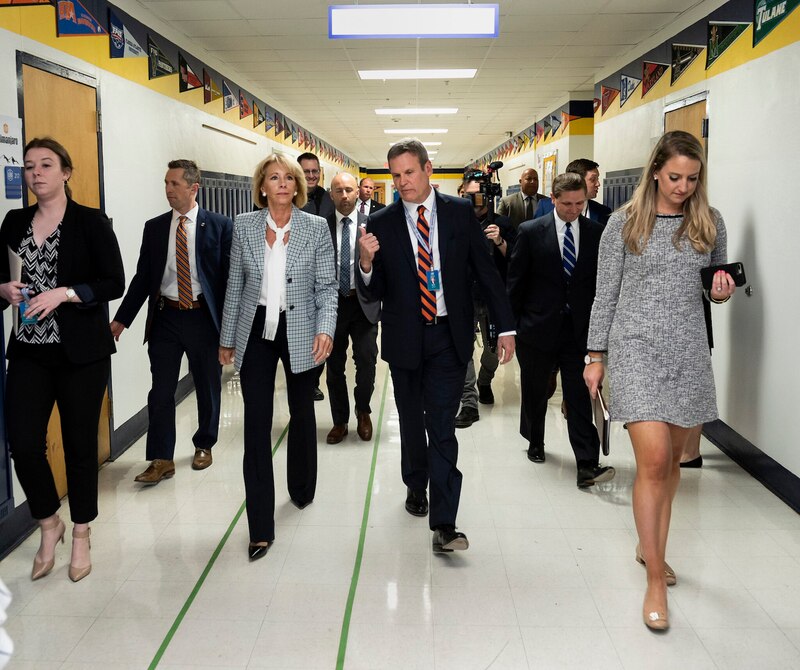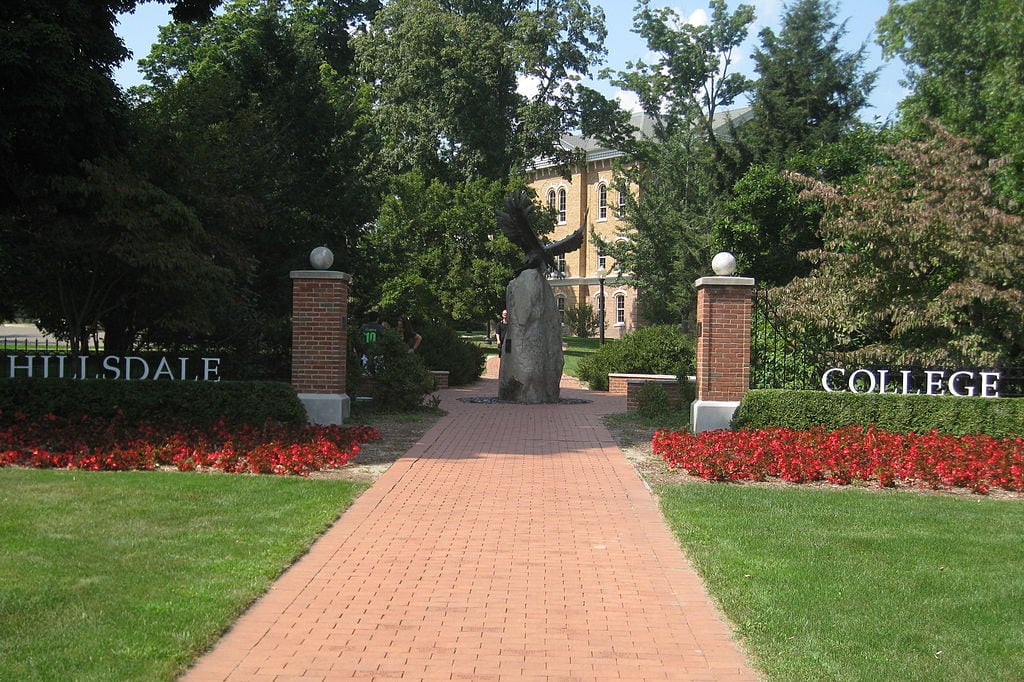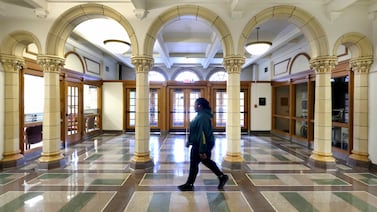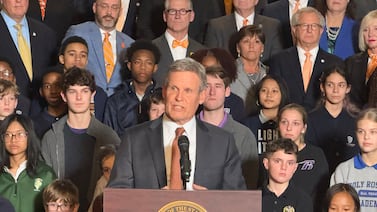Relatively few Tennesseans had heard of Hillsdale College before last week. But Gov. Bill Lee’s high-profile praise of the small private Christian school in Michigan has heightened tensions over his push to open new charter schools across Tennessee, especially those that align with his conservative ideology.
At his annual State of the State address on Jan. 31, the Republican governor lauded Hillsdale as a “standard bearer in quality curriculum” and said Tennessee was “formalizing a partnership with Hillsdale to expand their approach to civics education and K-12 education.”
The next day, Hillsdale announced plans to bring its “classical charter schools” to Tennessee. Through its affiliate American Classical Education Inc., the organization has filed applications to open three schools in 2023 through school systems in the growing suburban towns of Clarksville, Jackson, and Murfreesboro.
And those schools are just the beginning, said Hillsdale President Larry Arnn.
“The governor of Tennessee has talked me into a commitment to start 50 charter schools in Tennessee,” Arnn said in a speech last September to parents in Franklin, Tenn., according to a recording published by Hillsdale.
Late last week, the governor’s office did not dispute Arnn’s account, which included that Lee initially asked for 100 charter schools.
The emerging influence of Hillsdale, which has deep ties to the administration of former President Donald Trump, comes as the governor works aggressively to expand Tennessee’s charter school sector while his school voucher program is tied up in the courts.
Lee has proposed setting aside $32 million in next year’s state budget — half of it recurring — to help pay for facilities for new charter schools. The governor says the goal is to give parents more educational choices for their children. Critics argue that the publicly financed, independently operated schools drain students and funding from traditional public schools that must follow stricter rules than charters do.
In his annual state address, Lee said he visited Hillsdale to “spend time with champions of American exceptionalism” during a Presidents Day celebration two years ago.
There, the governor learned more about Hillsdale’s charter school work, which grew out of opening a private grade school on its campus in 1990. Hillsdale has since opened 20 more schools in 10 states and also provides curriculum to 33 private, parochial, or charter schools, including a charter school in Hamilton County.
“He was impressed with the college’s ongoing efforts in supporting K-12 schools with classical curriculum and training for school boards, leaders, and teachers,” said Kathleen O’Toole, Hillsdale’s assistant provost for K-12 education.
The Hillsdale approach is to provide secular “classical” education that emphasizes the liberal arts and sciences, as well as instruction in principles of moral character and civic virtue. Its civics curriculum focuses on America’s strengths rather than its shortcomings.
“The story of America is a wonderful story. All we talk about today is its warts,” Arnn said in December when Hillsdale hosted an online town hall to promote and raise money for its charter school initiative.
But some Tennesseans are wondering about Hillsdale’s potential impact on civics education, especially in light of a new state law that prohibits classroom discussions about systemic racism.
“Before making this decision to align with Hillsdale, I’m wondering how many other possibilities for civics education the governor considered,” said Mark Finchum, executive director of the Tennessee Council for the Social Studies, a professional organization representing the state’s social studies teachers.
Lee has made civics education a priority since taking office in 2019, with the state awarding more than $700,000 in grants aimed at improving the quality of instruction. Last year, Tennessee was one of five states rated exemplary by the right-leaning Fordham Institute for the quality, completeness, and rigor of its civics and U.S. history standards.
The governor was also the driving force behind a 2019 state law creating a powerful new charter school commission that can overrule local school board decisions and place new charter schools anywhere in the state. Currently, the state’s 115 charters are located only in its four largest cities, although the commission recently approved a new one for Rutherford County, south of Nashville, on appeal.

Charter schools also are now open to any Tennessee student, contrary to the state’s original 2002 charter law, which restricted enrollment to students who were low-performing, attending low-performing schools, or eligible for free or reduced-price lunch.
“What we’re now seeing is that the old charter and voucher narrative of wanting to help low-income children in struggling schools isn’t what this is really about,” said Rep. Jason Hodges, a Democrat whose high-achieving Clarksville school district received a charter application from the Hillsdale group.
“Charters are an easy way to privatize our public school system and they’re more popular with the public now than vouchers. The governor’s endorsement of Hillsdale is telling. This is purely about money and ideology,” Hodges said.
Founded by the Freewill Baptist denomination in 1844, Hillsdale gained early notoriety for its anti-slavery stance and its role in founding the new Republican Party. The school came under a modern spotlight for refusing federal requirements to count its students by race. After losing their case before the U.S. Supreme Court in 1984, the school rejected all federal and state funding to help guarantee its independence.
Arnn, who has presided over Hillsdale since 2000, apologized in 2013 after testifying before Michigan lawmakers that state officials had visited his school’s campus to determine whether enough “dark ones” were enrolled. He led the Trump administration’s 1776 Commission, which was formed as a direct challenge to The New York Times’ exploration of how racism and inequality shaped the nation’s founding through its 1619 Project. Arnn also serves on the board of the conservative Heritage Foundation.
Hillsdale is aggressively replicating its classical charter school model.
“Classical education is what we used to do in this country, back when education was working,” O’Toole said during Hillsdale’s town hall. She described classical education as “a common sense approach to teaching, coupled with a curriculum that brings the best methods for reading instruction, mathematics instruction, cursive, sentence diagramming — all of those things that we know really work — with the best [books and ideas] that Western civilization has produced.”
According to a 2019 report by the National Association for Charter School Authorizers, classical school applications are significantly more likely to be approved than for other charter models, such as single-gender schools or “no excuses” schools that emphasize discipline and high academic expectations, including college attendance.
Hillsdale’s K-12 influence goes beyond the work of its charter management organization. Several other charter groups applying for Tennessee charters this year say they plan to use Hillsdale resources.
USA Classical Academy’s application to open a school in Williamson County, south of Nashville, outlines plans to use Hillsdale curriculum, teacher training, and expertise. Williamson County Schools is one of the state’s highest-achieving districts, but some of its new Wit & Wisdom reading materials have been criticized by some parents as objectionable over their content, language and imagery.
“We are excited to bring a new, tuition-free K-8 charter school option to Williamson County with a focus on the liberal arts and sciences, moral character, and civic virtue,” says the Williamson County application, which notes that its model is “closely informed by Hillsdale College.”
Now the question is how school districts will handle charter applications from the Hilldale group after the governor’s public endorsement of the organization’s charter work.
“This would flow through the established, unbiased charter application, just like any other proposed public charter school,” said Casey Black, Lee’s press secretary. “We are simply introducing another high-quality option for Tennessee students.”
But Hodges, the Democratic representative from Clarksville, said the governor’s comments have interjected more politics into a process that he said was already political, both at the local and state level.
“Regardless of what the school board decides, the state Charter Commission is set up to make sure the charter is approved on appeal,” Hodges said. “There’s a reason the commission was brought to life, and we’re seeing it play out now.”
Chase Ingle, a spokesperson for the commission, said the body’s staff and commissioners have not had discussions with Hillsdale officials and are committed to an independent appeals process.






